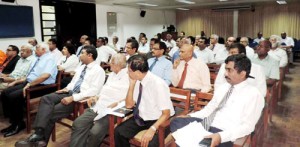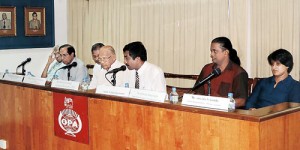New challenges for CEPA as Sri Lankan professionals turn on the heat
Pushing through the long-delayed Comprehensive Economic Partnership Agreement (CEPA) between Sri Lanka and India is going to be much harder now as new local groups are joining the anti-agreement campaign
If during Mahinda Rajapaksa’s regime, some ‘favoured’ industrialists led the charge against the proposed agreement, determined to block it on the grounds that it is detrimental to local interests, the transitional Maithripala-Ranil coalition government is encountering fresh opposition to the CEPA deal – from professional groups.
Professionals like doctors, accountants and architects were either subdued during the first phase of protests or didn’t raise their voice then, probably fearing ‘freedom of speech or victimisation’ reprisals under the former regime. The fresh outburst of protests is no doubt a plus point for freedom and the new Yahapalanaya (good governance) government!
Deputy Economic Planning Minister Harsha de Silva was an interested observer at a CEPA discussion organised on Monday in Colombo jointly by the Sri Lanka Economists’ Association (SLEA) and the Organisation of Professional Associations (OPA), and must have got a sense of a new kind of opposition emerging.

Section of the audience
For the first time perhaps, professionals stood up, identified themselves (fearlessly?) and ‘gently’ raised objections to the CEPA which they said would be more beneficial to the other side (Indian professionals). But they were also quick to point out that they are not critical of India, with “we have nothing against India, this is not a critique or India” type of comments.
Weeks ago, President Maithripala Sirisena told a group of entrepreneurs that he wouldn’t sign any trade agreement with another country that would affect local industry. Though he didn’t refer to any particular agreement, it was clear that he was referring to the proposed CEPA with India.
However a few weeks later, visiting Indian Prime Minister Narendra Modi threw the ball in the Sri Lankan court saying India was keen to conclude the agreement. He spoke at a Ceylon Chamber of Commerce (CCC) event where the CCC also, cautiously, endorsed the view with a caveat however: it should not affect local interests.
Agreements that would benefit Sri Lanka
At another, earlier CEPA discussion, Dr. de Silva also echoed similar sentiments saying Sri Lanka will enter into agreements of this nature as long as it is beneficial to the country.
During the previous government, former President Mahinda Rajapaksa, his minister-brother Basil and other high-ranking officials have publicly said CEPA was off the radar as long as it affects local interests.
Days before the Indian Prime Minister’s March 13th visit to Sri Lanka, pro-CEPA campaigners, asked by the Sunday Times whether the proposed agreement – which had been on the back-burner would be revised, said it was unlikely as the global scenario had also changed.
Two significant issues and positive thoughts that emerged on Tuesday was –the call for the CEPA document to be made public in this era of transparency.
The second point was that, CEPA or no CEPA, Sri Lankan systems are weak and low-skilled and mid-level foreigners are working in the country, using various ruses to evade detention.
Modi’s sentiments on CEPA, during his Colombo visit, rejuvenated the pro-CEPA lobby and led to a revived debate.
Economists appear to be divided on the issue – just like the famous ‘one-armed economist’ comment from former US President Harry Truman who referred to economists as, “On the one hand, this” and “On the other hand, that”. and that also emerged in Tuesday’s discussion too.
But surprisingly (or maybe given the ‘high intensity’ freedom levels perceived today), at Tuesday’s forum identified members from the medical, accountancy and architects’ bodies joined their industry colleagues in speaking out on the need for safeguards. There was no direct opposition to the CEPA but a lot of concern by the professionals – such views that were not heard in a public forum before. with a degree of candour.
During the question and answer session of the near 3-hour discussion, Dr. Malik Fernando, a retired physician who said he has represented the Sri Lanka Medical Association on CEPA issues, in raising the concerns of doctors said the agreement not only allows doctors but also nurses and other categories of medical personnel.He said a weakness in the high-level CEPA discussions is that it’s more about the private sector, trade and government/s. Unlike other professions, the medical profession has a strong bond with government institutions and the discussion should bring in the Health Ministry (representing views of the medical profession).
Health Ministry not invited
“The Health Ministry has not been invited and needs to be invited by the Department of Commerce for these discussions),” he asserted.
A strong call for the CEPA proposals to be revealed to the public and possibly published as a white paper seeking public comment, came from Lalith Kahatapitiya, a chartered engineer whose pioneering company KIK Lanka Ltd manufactures and supplies electrical panel boards.
“I would like to request the OPA to ask the Government for CEPA to be an open document for discussion,” he said, directing his query at the head table. SLEA President Prof. A.D.V. de S. Indraratna, who chaired the discussion, was seen nodding his head in agreement.
From the accountancy professionals, former CA Sri Lanka President Asita Talwatte spoke from the audience. He said they (accountants) share similar views of other professions on the concerns raised.
He said Sri Lanka’s accountants are highly skilled and there are enough jobs to cater to the current profession and those entering this sector.
“Indians don’t have the superior skills that we (Sri Lankan accountants) have,” he argued, also explaining that Sri Lanka has helped the profession in Bhutan and Nepal and was likely to help Myanmar and Vietnam too in improving skills of accountants. He said India has 150,000 chartered accountants while Sri Lanka has 4500.
A more vocal and impassionate contribution came from Nalaka Jayaweera, chartered architect, who said having been a member of a CEPA advisory committee was of no use as “our views and comments were not taken seriously”.
Mr. Jayaweera, who was a member of the panel, spoke on the need for national registrations of professional institutes referring to the example of the medical profession where foreign or foreign-qualified doctors seeking to practice in Sri Lanka must pass Act 16 (ERPM-Examination for Registration to Practice Medicine in Sri Lanka).
He said the Sri Lanka Institute of Architects is not similarly empowered or doesn’t have such powers (to examine qualifications of foreign professionals practising here).
“I have (during the CEPA committee-level meetings) recommended registration powers and argued the need for a national registration of

Panellists
institutes,” he said adding that Indian professionals working here will affect local professionals.
He said in India there are 12 million unemployed and four million unemployed graduates who could seek employment here. “But where do we stand and what do we have? Can we even start architectural, engineering firms there (in India)? Will that be permitted?”
Discussion more theoretical, ground level realities ignored
He believes the CEPA debate is currently more theoretical and doesn’t take the ground realities into consideration and noted that “Sri Lanka needs to put its house in order (being able to assess qualifications of other professionals working here for example), first,” he said.
Illustrating an example of how other countries are strict in permitting foreign professionals, he said that 400 out of the 4000-odd Sri Lankan architects have gone to Australia but are doing other work as entry levels are tough.
He and some other panellists were of the view that countries like Australia welcome professionals like accountants, etc but this is in the context of free trade in services, meaning individual firms or bodies offering jobs.
Restrictions however occur in agreements, they said.
While professionals brought a new element in the nagging CEPA debate, most of the issues discussed have been covered in the past too, particularly those raised by the local industrial sector. Opening the discussion, DSI Managing Director Kulatunga Rajapakse produced a lot of data and statistics saying “the figures will illustrate the situation as per exports, imports and items traded”.
Referring to the essence of the discussion “Do we need CEPA”, he said while Sri Lanka no doubt needs India to develop the local industry and it is very important to enter Indian markets, the reality is that the 17 year-old Free Trade Agreement (FTA) has failed and proved disadvantageous to Sri Lanka.
“While globally we have done well considering the stiff competition particularly in Europe, in India it has been in reverse. Are we exporting the right things to India?
Exports to India are mostly by foreign companies adding some value. The best products are restricted by quotas (non-tariff barriers),” he said, speaking while regularly displaying data on a screen.
He said the issues that they had with the FTA were intended to be resolved with the emergence of the CEPA which had three components: trade in services, movement of natural persons and investments.
He pointed out that in the computer services sector 50 per cent of the staff can be imported which would mean all the technical staff in a project in Sri Lanka set up under the FTA would be foreigners.
More foreign films?
As per the audio visual services, 40 per cent of cinema time could be foreign films. In respect of the movement of spouses, a (foreign) spouse can get employment.
In terms of retail trade, Indian firms will wipe out this business in Sri Lanka.
“We have to be cautious . we need a win-win situation,” he said pointing out that in terms of professional services only the medical profession under the Act 16 regulation can check the credentials and qualifications of Indian doctors seeking work here.
“No other profession has such safeguards,” he said, begging the question: If Sri Lankan companies, DAMRO and MAS Holdings are doing well in India having gone there and penetrated the market on their own, why is there a need for the CEPA.
“If we can do without CEPA (like DAMRO and MAS) why do we need to be bound by agreements which inevitably put Sri Lanka in a weaker position?” he said.
Sarath Rajapathirana, economist and World Bank retiree, said the term free trade is a misconception. There is nothing called free trade. it’s always binding.
While acknowledging that Sri Lanka should have good relations with India, he said “it doesn’t mean we should sign binding agreements that doesn’t benefit us. We can work outside agreements. We can have a relationship with India but not CEPA”.
Subashini Abeysinghe, an economist attached to research firm Verite Research, said Sri Lanka cannot avoid the global reality where dozens of trade agreements have been signed.
“There are over 300 trade agreements and many still in the works. These are realities that we need to deal with. We may not like it but are we to swim against the tide? In future you will find that all agreements have both trade in services and others (movement of person).”
While it might not be possible to arrive at a concluding assessment of CEPA from this discussion, some points raised like a more transparent discussion with the CEPA document in the hands of the public; that trade agreements are a reality and given the global trade perspective and Sri Lanka’s dependence on exports and foreign investments, the country cannot afford to swim against the global tide; and, the inevitable entry of foreign professional services could only be tackled with safeguards similar to Act 16 (and based on overseas models), appear to be pointers in the future direction of this debate.
| CEPA debate: Expected becomes unexpected When two professional associations came together on Tuesday to discuss the proposed Indo-Sri Lanka CEPA deal, Sunday Times Business Editor Feizal Samath was in the audience and expected the usual pro and anti-agreement lobbies ‘fighting’ it out. Nothing peculiar and very much an old issue! |


